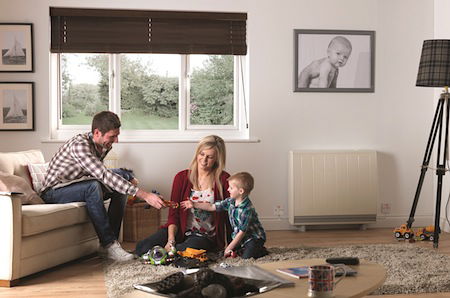Though not sustainable as such, the latest intelligent heating systems can save much energy and money, so are part of the sustainability mix. Chris Stammers, product marketing director at Dimplex, explores the reasons why the electric heating upgrades for the private rental sector could be the key for electrical contractors looking to drive business:

In 2013, the private rented sector overtook the social rented sector for the first time to become the second largest sector by tenure in England. Despite the reduced mortgage tax relief imposed on landlords, the build to rent sector is burgeoning and is set to soar with each new generation, while home ownership is set to continue falling.
It is clear that there is a huge pool of private landlords in the UK curating around four million private rented properties; but what does this mean for electrical contractors? To see the opportunity, you also need to understand the make-up of this private rented market.
According to the last available Census data, just 56% of people living in rented accommodation live in a house, compared to 91% of owner occupied residents; the remainder live in flats or apartments. The Government’s English Housing Survey 2012-13 shows that single occupants aged under 60 make up almost a quarter of all private rented sector households, while in 2012, the private rented sector had the lowest proportion of homes with gas central heating at 81%.
They also had the lowest energy efficiency (SAP rating) of all tenures since records began in 1996.
All of this paints a picture of small, inefficient homes fuelled by outdated, ineffective heating systems – especially flats, where gas supply is often not available. It explains the high penetration of electric heating in privately rented homes, and highlights the need for investment.
Too many private rented homes are heated by outdated or incorrectly specified appliances, often meaning tenants are paying over the odds for their bills. And therein lies the opportunity for contractors.
EPCs forcing change
As with many sectors, legislation is already forcing change. From April 2016, landlords must consider any request from tenants to improve the energy efficiency of their property. After January 2018, properties must have an EPC (Energy Performance Certificate) rating of ‘E’ or above if they are to be rented out and DCLG estimates that nearly 70% of all electrically heated properties would get an EPC benefit by upgrading to a newer electric system.
Landlords who have spent years neglecting their properties in pursuit of higher profits will be forced to spend – and with heating accounting for more than 60% of energy in the home, it’s the obvious place to start making improvements.
Take care with specification
Contractors must react to this demand and make sure they have the stock, knowledge and understanding to sell accordingly. Work with your manufacturer of choice to gain a thorough understanding of low cost innovative solutions like Dimplex Quantum and promote their benefits; remember that electric heating systems will only be a cost-effective solution for clients if they are specified correctly.
For example, many private tenants continue to live with outdated storage heaters – in fact, there are around two million homes with storage heaters in need of replacement in the UK.
In some cases, with highly insulated properties or in individual rooms, electric radiators such as the highly intelligent Dimplex Q-Rad can offer a viable solution, delivering controllable heat at the touch of a button. However, it is important to specify the right heating system to suit the property and match the lifestyle of the user – and many tenants will find a system comprising only direct acting panel heaters can cost them significantly more to run than off peak heating.
Contractors must understand this, working with their customers to deliver the right solution – and with a full range of electric heating appliances, Dimplex is well placed to offer advice.
The Dimplex Quantum system, for example, gives users the chance to store energy during cheaper, off-peak periods and use it when they need it, through the day. It is up to 47% cheaper to run than an electric convector or radiator system and could save up to £975 per year running costs when compared to an electric radiator-only system. Even when savings are passed onto the tenant, these kinds of figures simply cannot be ignored.
And finally…
In summary, electric heating will continue to drive sales across all sectors. With continued pressure to reduce the UK’s carbon emissions, further innovation from manufacturers and an increasing understanding of energy efficiency, demand will come from domestic and commercial sectors, spanning owner occupied, social rent and private rent tenures.
However, spotting opportunities for growth is as important now for electrical contractors as it always has been. That’s why privately rented homes could be the key to unlocking new business opportunities.
For more information, go to: www.dimplex.co.uk
